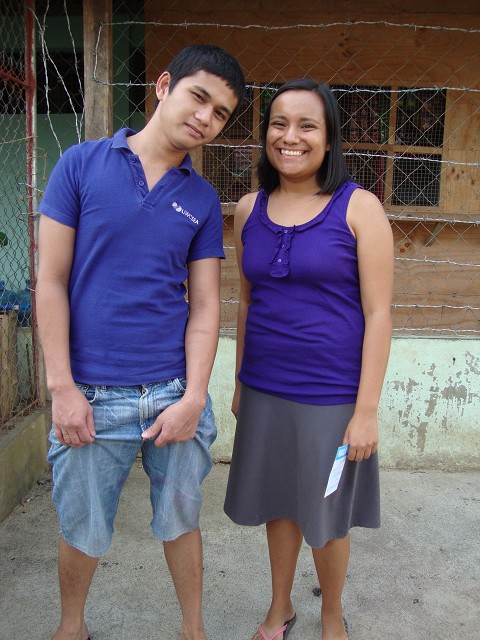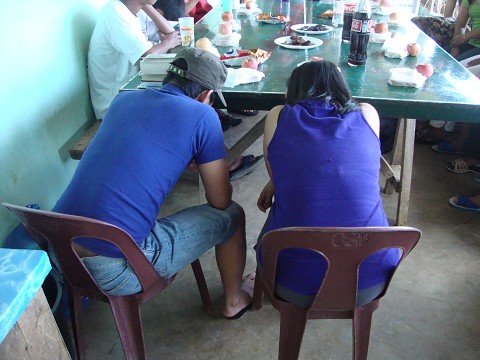“You’re the only one who survive,” he said.
I didn’t understand, but when I asked Kikim what he meant by that statement, he started to talk about other people who had gone to teach him, but had given up only after a couple of days.
During our time in Malaybalay, we would head there every day to teach the minors. Through our daily conversations, Kikim and I found out more about each other.
I learned how he has trouble trusting women because of the problems he has with his mother. How he calls himself the black sheep of

the family because his brothers and sisters are all “good” church-going people so they disowned him. How even though one set of his grandparents lives just a five minute walk away, they never visit him. And how the only person in his family who ever showed him true love was his grandmother and she died when he was already in jail. He told me of his plans to kill himself on some days. And other days he would say he thought he had a 50/50 chance of surviving another year. Those were the good days.
The day before his birthday he said he had no reason to celebrate and that I better not get him anything. He originally didn’t want to accept the book I had bought him because he said he likes to work for what he has.
When I told
Jodi and
Emily that his birthday was coming up, though, we all decided we’d have a celebration at the jail. By that point the warden had given us permission to teach the kids on the basketball court instead of through the bars.
So the night before we made brownies, Jodi bought balloons and soda, and we all got ready to have a party. When he walked out the following day we sang to him and he turned away, surprised. But there was a smile on his face.
We ate, drank and talked. Even though he still said there was a 50/50 chance of him surviving another year, he smiled like I’d never seen him smile before. He joined the other kids for a game of Uno and laughed and joked. He was changing.
It was the first birthday party he’d ever had.
And until that day he had never really interacted with any of the other kids in his cell. I know this because Kikim’s girlfriend showed up that day to visit and she gave me another glimpse into his life.
For two days I ended up with two students. It got a little easier because her English was better than his, but at the same time it got harder. She’d be leaving the day before we were going to, so two people would be leaving him. He would tear up at the thought.
The very last day of class, we decided to have a graduation for them. We had cookies, brownies, sandwiches, chips and soda. Emily and Jodi made photo albums for each of them with pictures they’d taken the day before (we also got special permission from the warden to bring cameras). They also made care packages for them with basic hygiene items.
Sunday afternoon, I walked up to his cell and called for him. He was still in bed, behind a curtain. Crying. I started crying, too. He didn’t want to come out because he said us leaving was no celebration. I told him he couldn’t leave me to cry alone so he came out.

For the first hour or so he never looked up. Even when he’d talk to me through tears he was looking down, not wanting to show me his tears. We talked through the ceremony.
He asked why I had to leave. I told him I believed that God had made him strong enough to make it on his own.
He told me that I understood him, that I was his friend and that he wanted to continue studying. He wanted to know why I wasn’t coming back to the Philippines in July. I sat there for a second wondering the same things.
But then the words poured out of me. I told him I was certain that he was destined for more. That there was not a doubt in my mind that I could come back in a few years and he’d be changing others’ lives, whether in a prison cell or on the streets of Malaybalay. There is no way he’s not. I told him I understood his depression, and I said something that I hadn’t thought about, but just came out–“I’d go through my depression all over again if I knew that my pain would help your recovery.”
At that he said, “I feel change is coming… But I’m just not ready.”
A couple of hours later, I walked away from him for the last time and told him, “Kikim, stop being afraid of God.”
He nodded and hugged me goodbye.
 the family because his brothers and sisters are all “good” church-going people so they disowned him. How even though one set of his grandparents lives just a five minute walk away, they never visit him. And how the only person in his family who ever showed him true love was his grandmother and she died when he was already in jail. He told me of his plans to kill himself on some days. And other days he would say he thought he had a 50/50 chance of surviving another year. Those were the good days.
the family because his brothers and sisters are all “good” church-going people so they disowned him. How even though one set of his grandparents lives just a five minute walk away, they never visit him. And how the only person in his family who ever showed him true love was his grandmother and she died when he was already in jail. He told me of his plans to kill himself on some days. And other days he would say he thought he had a 50/50 chance of surviving another year. Those were the good days.  For the first hour or so he never looked up. Even when he’d talk to me through tears he was looking down, not wanting to show me his tears. We talked through the ceremony.
For the first hour or so he never looked up. Even when he’d talk to me through tears he was looking down, not wanting to show me his tears. We talked through the ceremony. 







